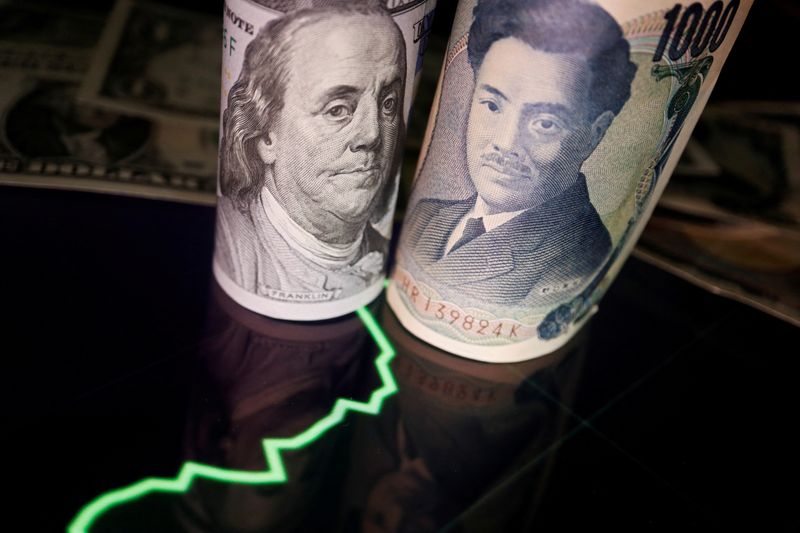By Samuel Indyk and Rae Wee
LONDON (Reuters) - The yen slipped on Tuesday after its biggest daily rise since mid-July the day before after comments from Japan's top central banker on a possible end to its negative interest rate policy reverberated throughout markets.
The dollar, meanwhile, regained lost ground after clocking its biggest daily fall since July 13 on Monday, while the pound slipped after mixed UK labour market data.
Bank of Japan (BOJ) Governor Kazuo Ueda told a newspaper interview over the weekend the bank could get enough data by year-end to determine whether it can end negative rates, remarks that on Monday saw the yen clock its largest daily gain against the dollar since July 12.
The Japanese currency was last 0.2% lower at 146.915 per dollar, after scaling a one-week top of 145.91 in the previous session.
"Ueda's comments were a little more balanced than you would have thought from the market reaction," said Adam Cole, chief currency strategist at RBC Capital Markets.
"Japan is still a long way from meeting the criterion of sustainable 2% inflation and the comments don't really on Monday change much for me," Cole added.
The yen has come under immense pressure against the dollar as a result of growing interest rate differentials with the United States, since the Federal Reserve began its aggressive rate-hike cycle last year while the BOJ remains a dovish outlier.
Taking a different view, however, Japan's senior ruling party official Hiroshige Seko said on Tuesday he took Ueda's remarks as meaning that the central bank will continue with monetary easing.
Elsewhere, the U.S. dollar reversed some of its losses from the previous session, with the euro falling 0.3% to $1.0716 after touching a one-week high of $1.0771 ahead of Thursday's European Central Bank policy announcement.
The pound fell after a mixed UK labour market report that showed more signs of cooling in the three months to July, but wage growth continued to rise quickly, and above the rate of inflation.
"Drill down and if you strip out the public sector, private sector pay barely increased in level terms between June and July," said ING UK economist James Smith.
"With unemployment notching higher, the labour market data doesn't scream a need to keep hiking rates much further."
Sterling was last down 0.3% against the dollar at $1.2471 and little changed against the euro.
U.S. INFLATION DATA IN FOCUS
Attention was now turning to U.S. inflation data for the month of August due on Wednesday, with traders on the lookout for whether the Federal Reserve has further to go in raising rates.
The U.S. dollar index, which ended last week with an eight-week winning streak, rose 0.2% to 104.80, after falling 0.5% in the previous session, its biggest one-day drop since July 13.
"The U.S. data is the main event of the week because the Fed is so sensitive to incoming inflation data," RBC's Cole said, noting that the bigger risk for the dollar is to the downside, given a larger number of forecasts for core inflation are above consensus.
"An in-line number would be disappointing for the dollar and therefore we're negative on the release itself," Cole added.
The Aussie was last 0.2% lower at $0.6419 while the New Zealand dollar fell 0.4% to $0.5899.
The onshore and offshore yuan both found support near their one-week highs and last bought 7.2925 per dollar and 7.3109 per dollar, respectively.
The two had clocked their largest daily gains against the dollar in about six months on Monday.

Reuters reported that China's central bank was tightening its scrutiny of bulk dollar purchases by domestic firms, at a time when the yuan faces mounting depreciation pressure.
In cryptocurrencies, bitcoin rose almost 4% to $26,141, after falling below $25,000 for the first time in three months on Monday.